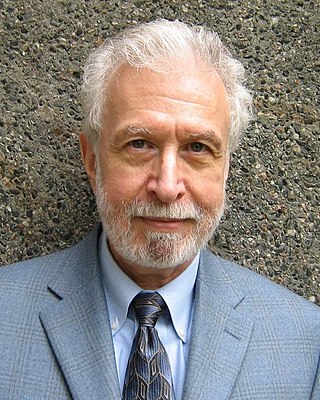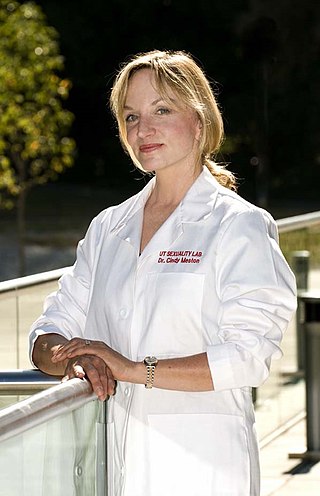Related Research Articles
Paraphilia is the experience of intense sexual arousal to atypical objects, situations, fantasies, behaviors, or individuals. It has also been defined as sexual interest in anything other than a consenting human partner.
The Masters and Johnson research team, composed of William H. Masters and Virginia E. Johnson, pioneered research into the nature of human sexual response and the diagnosis and treatment of sexual disorders and dysfunctions from 1957 until the 1990s.
Anorgasmia is a type of sexual dysfunction in which a person cannot achieve orgasm despite adequate stimulation. Anorgasmia is far more common in females than in males and is especially rare in younger men. The problem is greater in women who are post-menopausal. In males, it is most closely associated with delayed ejaculation. Anorgasmia can often cause sexual frustration.
Persistent genital arousal disorder (PGAD), previously called persistent sexual arousal syndrome, is spontaneous, persistent, unwanted and uncontrollable genital arousal in the absence of sexual stimulation or sexual desire, and is typically not relieved by orgasm. Instead, multiple orgasms over hours or days may be required for relief.
Hypoactive sexual desire disorder (HSDD), hyposexuality or inhibited sexual desire (ISD) is sometimes considered a sexual dysfunction, and is characterized as a lack or absence of sexual fantasies and desire for sexual activity, as judged by a clinician. For this to be regarded as a disorder, it must cause marked distress or interpersonal difficulties and not be better accounted for by another mental disorder, a drug, or some other medical condition. A person with ISD will not start, or respond to their partner's desire for, sexual activity. HSDD affects approximately 10% of all pre-menopausal women in the United States, or about 6 million women.
Sexual dysfunction is difficulty experienced by an individual or partners during any stage of normal sexual activity, including physical pleasure, desire, preference, arousal, or orgasm. The World Health Organization defines sexual dysfunction as a "person's inability to participate in a sexual relationship as they would wish". This definition is broad and is subject to many interpretations. A diagnosis of sexual dysfunction under the DSM-5 requires a person to feel extreme distress and interpersonal strain for a minimum of six months. Sexual dysfunction can have a profound impact on an individual's perceived quality of sexual life. The term sexual disorder may not only refer to physical sexual dysfunction, but to paraphilias as well; this is sometimes termed disorder of sexual preference.
The human sexual response cycle is a four-stage model of physiological responses to sexual stimulation, which, in order of their occurrence, are the excitement, plateau, orgasmic, and resolution phases. This physiological response model was first formulated by William H. Masters and Virginia E. Johnson, in their 1966 book Human Sexual Response. Since that time, other models regarding human sexual response have been formulated by several scholars who have criticized certain inaccuracies in the human sexual response cycle model.
Sexual medicine or Psychosexual medicine as defined by Masters and Johnsons in their classic Textbook of Sexual Medicine, is “that branch of medicine that focuses on the evaluation and treatment of sexual disorders, which have a high prevalence rate." Examples of disorders treated with sexual medicine are erectile dysfunction, hypogonadism, and prostate cancer. Sexual medicine often uses a multidisciplinary approach involving physicians, mental health professionals, social workers, and sex therapists. Sexual medicine physicians often approach treatment with medicine and surgery, while sex therapists often focus on behavioral treatments.
Female sexual arousal disorder (FSAD) is a disorder characterized by a persistent or recurrent inability to attain sexual arousal or to maintain arousal until the completion of a sexual activity. The diagnosis can also refer to an inadequate lubrication-swelling response normally present during arousal and sexual activity. The condition should be distinguished from a general loss of interest in sexual activity and from other sexual dysfunctions, such as the orgasmic disorder (anorgasmia) and hypoactive sexual desire disorder, which is characterized as a lack or absence of sexual fantasies and desire for sexual activity for some period of time.

Ray Milton Blanchard is an American-Canadian sexologist, best known for his research studies on transsexualism, pedophilia and sexual orientation. He found that men with more older brothers are more likely to be gay than men with fewer older brothers, a phenomenon he attributes to the reaction of the mother's immune system to male fetuses. Blanchard has also published research studies on phallometry and several paraphilias, including autoerotic asphyxia.
Sex and drugs date back to ancient humans and have been interlocked throughout human history. Both legal and illegal, the consumption of drugs and their effects on the human body encompasses all aspects of sex, including desire, performance, pleasure, conception, gestation, and disease.
Delayed ejaculation (DE) describes a man's inability or persistent difficulty in achieving orgasm, despite typical sexual desire and sexual stimulation. Generally, a man can reach orgasm within a few minutes of active thrusting during sexual intercourse, whereas a man with delayed ejaculation either does not have orgasms at all or cannot have an orgasm until after prolonged intercourse which might last for 30–45 minutes or more. Delayed ejaculation is closely related to anorgasmia.
Dr Julia R. Heiman is an American sexologist and psychologist. The sixth Director of The Kinsey Institute for Research in Sex, Gender, and Reproduction at Indiana University, she began on June 1, 2004. Dr. Heiman is also a professor in the Psychology Department at Indiana University with a joint appointment in the Psychiatry Department at the IU School of Medicine in Indianapolis.
Sexual obsessions are persistent and unrelenting thoughts about sexual activity. In the context of obsessive-compulsive disorder (OCD), these are extremely common, and can become extremely debilitating, making the person ashamed of the symptoms and reluctant to seek help. A preoccupation with sexual matters, however, does not only occur as a symptom of OCD, they may be enjoyable in other contexts.
Robert Taylor Segraves is an American psychiatrist who works on sexual dysfunction and its pharmacologic causes and treatments.

Lori Anne Brotto is a Canadian psychologist best known for her work on female sexual arousal disorder (FSAD).
Sexuality can be inscribed in a multidimensional model comprising different aspects of human life: biology, reproduction, culture, entertainment, relationships and love.
Richard C. Friedman was an academic psychiatrist, the Clinical Professor of Psychiatry at Weill Cornell Medical College, and a faculty member at Columbia University. He has conducted research in the endocrinology and the psychodynamics of homosexuality, especially within the context of psychoanalysis. Friedman was born in The Bronx, New York.
Compulsive sexual behaviour disorder (CSBD), also known as hypersexual disorder, is a pattern of behavior involving intense preoccupation with sexual fantasies and behaviours that cause distress, are inappropriately used to cope with stress, cannot be voluntarily curtailed, and risk or cause harm to oneself or others. This disorder can also cause impairment in social, occupational or other important functions.

Cindy Meston is a Canadian-American clinical psychologist well-known for her research on the psychophysiology of female sexual arousal. She is a Full Professor of Clinical Psychology at the University of Texas at Austin, Director of the Female Sexual Psychophysiology Laboratory, and author of Why Women Have Sex. In 2016, the BBC, London, England named Meston one of the 100 most influential and inspirational women in the world.
References
- ↑ Elkind, Peter January 1987. Reporter: The Sensuous Aggie. Texas Monthly , p. 72
- ↑ United Press International (January 12, 1985. Women show greater sex drive. New York Times
- ↑ Goleman, Daniel (October 18, 1988). Chemistry of sexual desire yields its elusive secrets. New York Times